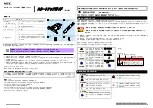
S e n d d o c u m e n t a t i o n c o m m e n t s t o m d s f e e d b a c k - d o c @ c i s c o . c o m
55-2
Cisco MDS 9000 Family CLI Configuration Guide
OL-16184-01, Cisco MDS SAN-OS Release 3.x
Chapter 55 Configuring Fabric Configuration Servers
About FCS
In
Figure 55-1
Management Application 1 (M1) is connected through an F port with port VSAN ID 1,
and Management Application 2 (M2) is connected through an F port with port VSAN ID 2. M1 can query
the FCS information of switches S1 and S3, and M2 can query switches S3 and S4. Switch S2
information is not known to both of them. FCS operations can be done only on those switches that are
visible in the VSAN. Note that M2 can send FCS requests only for VSAN 2 even though S3 is also a part
of VSAN 1.
Figure 55-1
FCSs in a VSAN Environment
Significance of FCS
This section lists the significance of FCSs.
•
FCSs support network management including the following:
–
N port management application can query and obtain information about fabric elements.
–
SNMP manager can use the FCS management information base (MIB) to start discovery and
obtain information about the fabric topology.
•
FCSs support TE and TL ports in addition to the standard F and E ports.
•
FCS can maintain a group of modes with a logical name and management address when a platform
registers with it. FCSs maintain a backup of all registrations in secondary storage and update it with
every change. When a restart or switchover happens, FCSs retrieve the secondary storage
information and rebuild its database.
•
SNMP manager can query FCSs for all IEs, ports, and platforms in the fabric.
Management
Application 1
Switch 1
(dFCS1)
Management
Application 2
Switch 4
(dFCS4)
Switch 3
(dFCS3)
Switch 2
(dFCS2)
ISL1
ISL2
ISL3
F port
(port VSAN=1)
(port VSAN=2)
F port
VSAN 3
VSAN 2
VSAN 1
85581
N port
















































